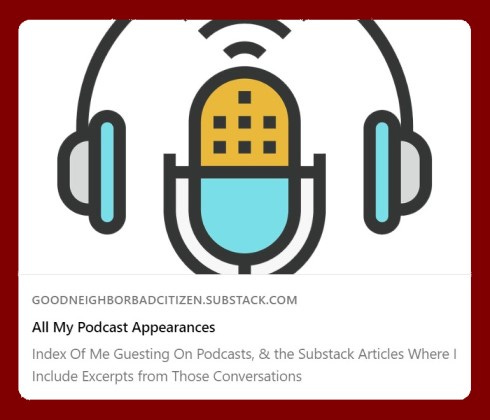♪♫ ‘We Built This City …’ ♪♫
Rene Girard, Part IV — The ‘Founding Murder’, Dunbar’s Number, In-Group/Out-Group … & Jesus’ Alternative
Articles in the Rene Girard series:
Part I — Ancient Memes & Modern ‘Lawfare’
Part II — Simple Things Replicate; Complex Things Grow
Part III — Antivirus Mindware
Part IV — ♪♫ ‘We Built This City …’ ♪♫ [YOU ARE HERE!]
Part V — Jesus Christ, Memelord?
Part VI — Does God Accept You As You Are?
Part VII (Series Finale!) — Christmas: More Than ‘Wonder & Awe’
Fans of 1980s pop music might’ve read the title of this article and, thinking of the song by the band Starship, finished the line with “… on rock-n-roll!”
Starship’s rock anthem looks nostalgically at a city that has become way too corporatized and financialized. They make an impassioned plea for people to remember the origins of their once-glorious culture.
Essentially, the song imagines that the direction of society can be brought back around to what it was.
Rene Girard agrees about the cyclical nature of large communities, but he posits a more gruesome origin story than rock-n-roll music for cities and civilizations: murder!
I talked about this aspect of Girard’s book on mimetic/meme cycles, I See Satan Fall Like Lightning, during my Oct. 9, livestreamed conversation with Monica Perez on her self-titled “The Monica Perez Show” (replays available at YouTube and Twitter/X).

And it was an early insight Monica made about a related topic that illuminated the “founding murder” hypothesis when we got to it later in the show.
Diving in to groups
Civilizations emerge, Girard claims, not because of the “implausible … social contract” theorized by many modern intellectuals, but through a “collective murder” of a victim that brings people together.
Building on Girard, I think this rests in our understanding of the “in-group” — a social set that a person feels part of — and its natural opposite, the “out-group.” A deeper dive into the terms can be found here and here and plenty of other places online and offline.
In-groups and out-groups are often synonymous with “us vs. them” and the prejudice-tinged “othering” of undesirables.
At small, tribal scales, in-groups are intuitive. As I said on the podcast:
[Small tribes] exist by clearly defining the in-group first in substantive terms. It’s people you see every day, interact with. It’s people who are closely related to you. … Then you define your out-group as a derivative of the in-group: Anybody who’s not in the in-group is part of the out-group.
But beyond the Dunbar Number, which is about 150 people, blood relations get thinner, and frequent, meaningful interactions with everyone become impossible. At this larger scale — the scale where cities, civilizations, and cultures emerge — the dynamic flips:
When you get to bigger groups of people — populations that no longer share a tribal connection — it’s no longer possible to define the in-group. So how do these civilizations come together? Well, the Girard theory is that they coalesce around just picking out some common enemy, and then everybody who joins in ganging up on the common enemy now becomes part of the de facto in-group.
When you can no longer define the in-group first and then get your out-group from it, you then descend into defining an enemy first.
This in-group is fragile, though, because it’s a shallowly derived relationship rather than a positive, substantive one. It’s why large groups always need new outcasts, enemies and victims, to practice new iterations of “founding murder” rituals. I said, rather excitedly by this point:
Governments do it all the time! They always need an enemy! You can’t keep people together unless there’s an enemy! You can’t keep political parties together unless there’s an enemy!
Yes, modern government — including party-laden democracies/republics — operates on gruesome, primitive psychology. It’s inescapably, perpetually stupid and evil.

Getting out of group pathology
The way to escape the worst aspects of what Girard calls the mimetic cycle is to exalt human dignity. In my book, in this weekly blog, and now on my new podcast, “Sunday Buffet,” I call it the “good neighbor” mindset. I ground it in the example Jesus gives people, as recorded in the canonical Gospels.
And it manifests in a way that Monica put thusly, very early in our talk:
I thought the most significant takeaway or lesson that Jesus imparted was to do away with the in-group/out-group thing.
It’s an extremely important point, and a fortunate foreshadowing of what we discussed later in the podcast.
Yes, Jesus shows a new way of viewing people that breaks through the collectivist categories. It’s something many voluntarists take to heart, as well. And it’s not about trying to eliminate in-groups, because such a thing would be impractical and quite harmful! As I said in response to Monica’s insight:
We all have in-groups, because we’re simply social creatures. …
The problem is … if you use the firm out-group designation for people … that’s not what Jesus wants to do. And if you impose that on people might-makes-right style, then that’s really contrary to what Jesus is. Now you’re talking about what I would call citizenship, which is your place in the imposed, hierarchical social order. …
[For Jesus] instead of in-group/out-group, it’s in-group and not-yet-group, or in-group and maybe-again-group.

Monica and I kept digging into the in-group, talking about friendship and the social dynamics described in the canonical Gospels. I encourage you to check out the entire archived livestream, and I might have more to say about it on the Oct. 27 “Sunday Buffet,” too!
All told, Girard makes a solid case that brutal methods of social cohesion are the norm in the history of civilization. And he also points toward the worthiest of exceptions to that meme-level rule: Jesus and the anarchist/voluntarist Early Church.
With greater psychological and ethical development, better ways of forming community can emerge.
We could maybe even build a city on rock-n-roll.
We built this Comments section on …
… your thoughts!
What kinds of groups do you feel you belong to? How do you avoid prejudice and harmful “othering” of people you don’t know?
Ever change your opinion of someone drastically enough that an adversary became a friend (or vice-versa)?
How do you deal with the tension of navigating large societies built on, essentially, victimizing people?
Anything else interest you about today’s themes?
Share below …
—
Find me on X: https://x.com/GoodNeighBadCit




Prechorus auto corrected to precious
Interestingly this song contains one of the most misquoted lyrics. In the precious, people believe they sing "Marconi plays the mambo" referring to the style of Cuban music. In fact the lyrics is "Marconi plays the mamba", as in the radio is the snake 🐍. Further commenting on the corporatisation of music.